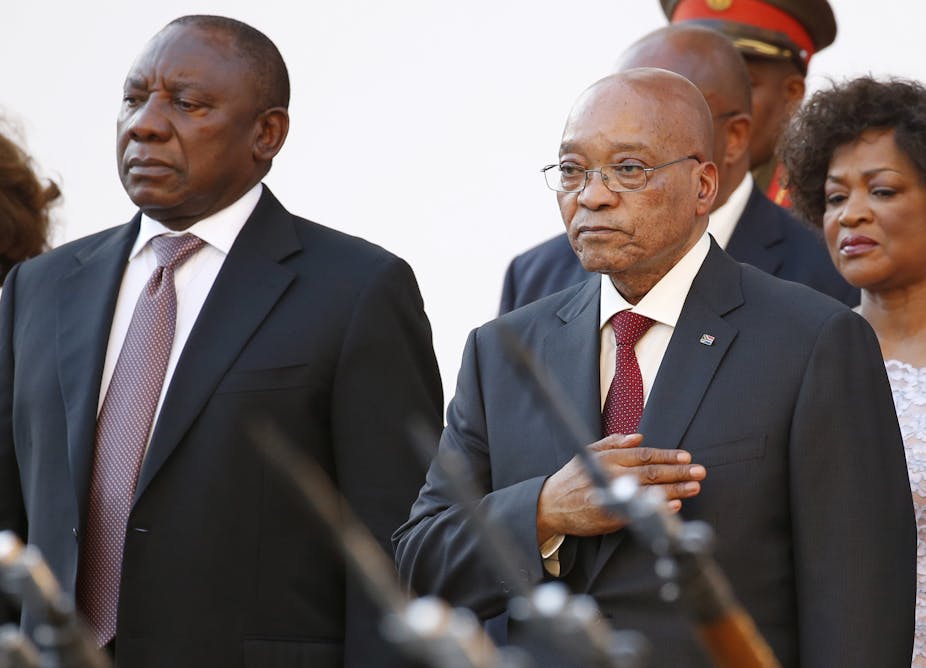The South African economy has been performing very poorly. Like other commodity exporters, export prices have weakened dramatically, company results have deteriorated and foreign and domestic investment have slowed down sharply. South Africa’s performance has been - and is expected to continue to be - worse than that of many other African economies, including commodity exporters. Africa’s anticipated growth rate for 2016 is 3.5% as against South Africa’s 0.9%.
The country’s performance is also worse than many other middle income developing countries. Since 2013 the growth rate has been below the population growth rate — per capita income has been declining for three consecutive years. It will be four shrinking years by the end of 2016.
The fragility of the situation, which has been a matter of concern to economic analysts for some time, became clear to all with the events of December 2015.
Many commentators felt that President Jacob Zuma acknowledged in his State of the Nation Address that there was a serious economic problem and was beginning to address it. A key admission was included. For the first time in many years the poor condition of the economy was attributed to domestic policy deficiencies, as well as to international conditions.
But the address was short on detail. This placed a great burden on the deliverer of the budget - one made even heavier by President Zuma’s surprising endorsement of the qualities of the 4-day finance minister, Des van Rooyen, days before the budget. The burden on Minister Gordhan was both to demonstrate, somehow, a real commitment by the government to key structural reforms, and to fill in some details.
A good budget
There are many good things about the budget. The commitment to cutting the government payroll by close to R25 billion over the next three years is important. The allocation of the burden of additional taxation was, progressively, mostly on the rich and the otherwise sinful. Bracket creep and the higher fuel levy will affect the middle classes and better-off parts of the working class too.
The shifts in allocation towards basic education, higher education, infrastructure expenditure, health and social protection are all welcome and necessary.
The specific references to private sector participation in South African Airways/SA Express, the ports and the freight rail sector are tantalising.
Also good are the frequent references to the need to revive social partnerships, indications of a resurrection of public-private partnership initiatives, and the repeated recognition of the need to improve the policy and regulatory environment for private investment.
Promises to keep
A frustrating thing about the budget is that many of the key commitments relating to how policies will support growth are, at best, pointers.
For example, the budget speech references the need for “structural reforms” to provide an environment for growth, but these reforms are not much elaborated in the speech or the Budget Review.
Similarly there are references to the need to remove uncertainties in government policies and regulations affecting investment and “institutional barriers to business investment and growth”, without specifically referring to the burning issues. In the Budget Review there is more detail, but barely enough.
There are references to phasing out state entities that are redundant without naming names.
There are welcome commitments to raising support to small business development, but little about how this will be done.
Easing back into the saddle
As Gordhan is barely two months into his new term as Finance Minister, vagueness is understandable, even forgivable. It may take a few more months to for him be certain of how he wants to operationalise the commitments to support growth in the budget. But the immediate response of the markets to the budget suggests that he doesn’t have a lot of time before he needs to be more specific.
It is difficult to know how much the lack of detail in the growth strategy is due to the newness of the Minister, how much is due to political protocol (the need to consult further with cabinet colleagues), and how much is due to the fact that the limited degree of agreement within the governing party and the ruling alliance forms a constraint that he is still testing.
The signals over the next few weeks will be very important. Will the President, the Deputy President (Cyril Ramaphosa) and other members of the cabinet speak with one voice and support the commitments that the Minister of Finance has made to structural changes? Will the Minister himself be allowed to join the dots? If not, the risk is that negative perceptions will begin to undermine reform initiatives.
Reforms take time. The Minister warned that “the action we require involves collective action by many stakeholders”. Coordination of stakeholders can be time consuming and challenging. It will require buckets of political capital.
Strong and committed leadership in government and beyond will be critical to the ability of this budget to deliver the growth supporting reforms which have been promised.

